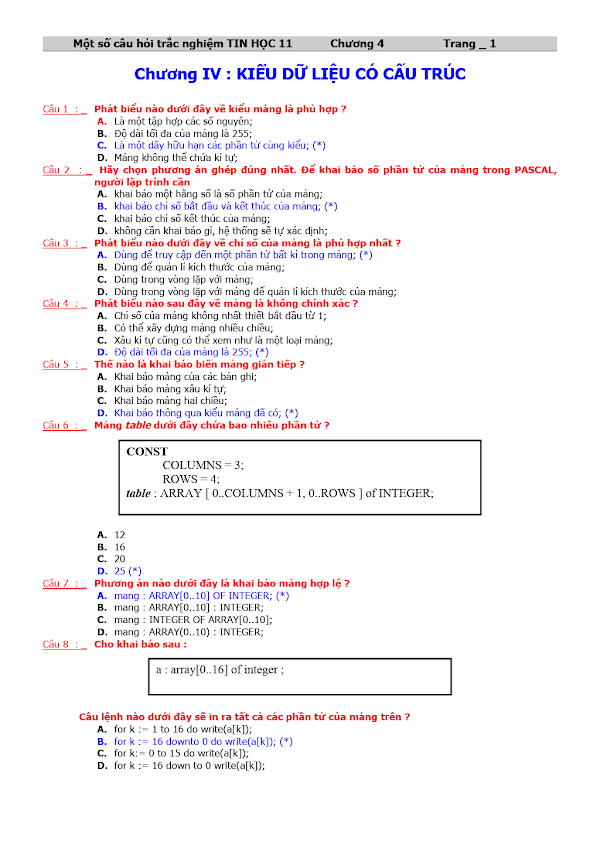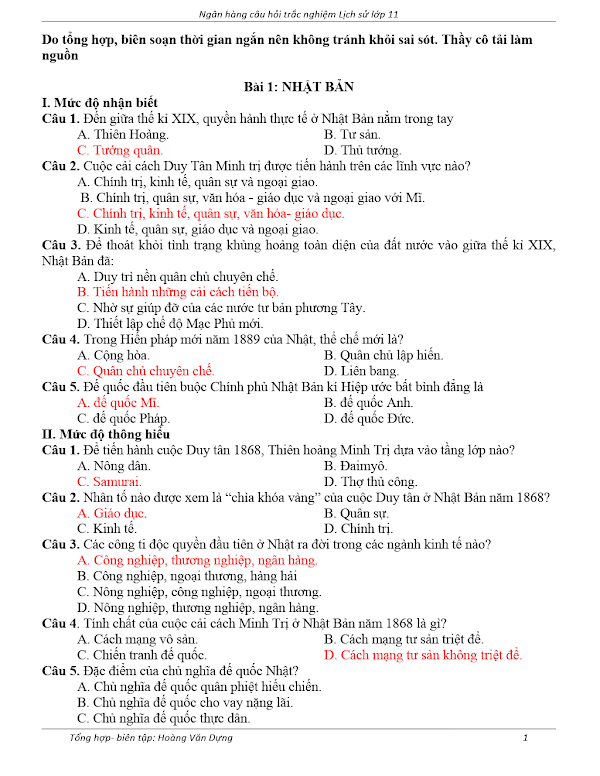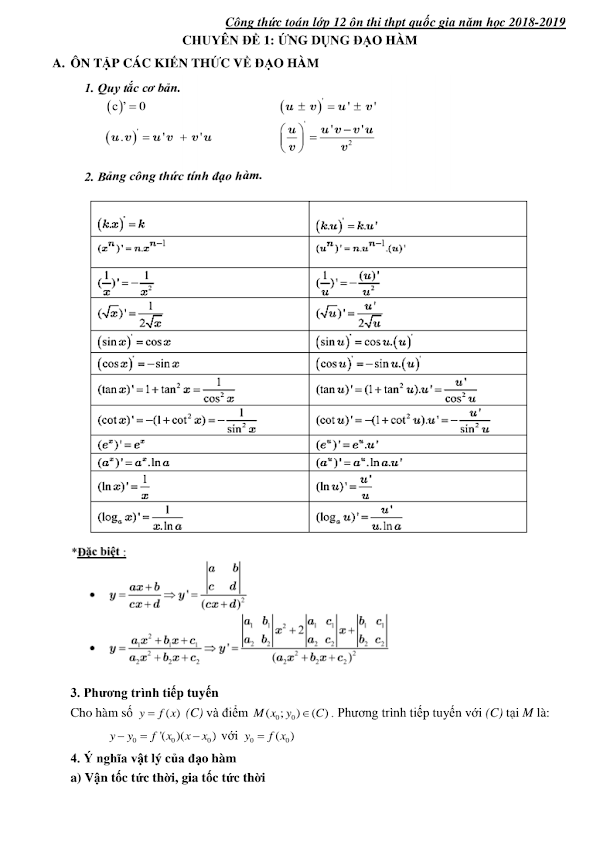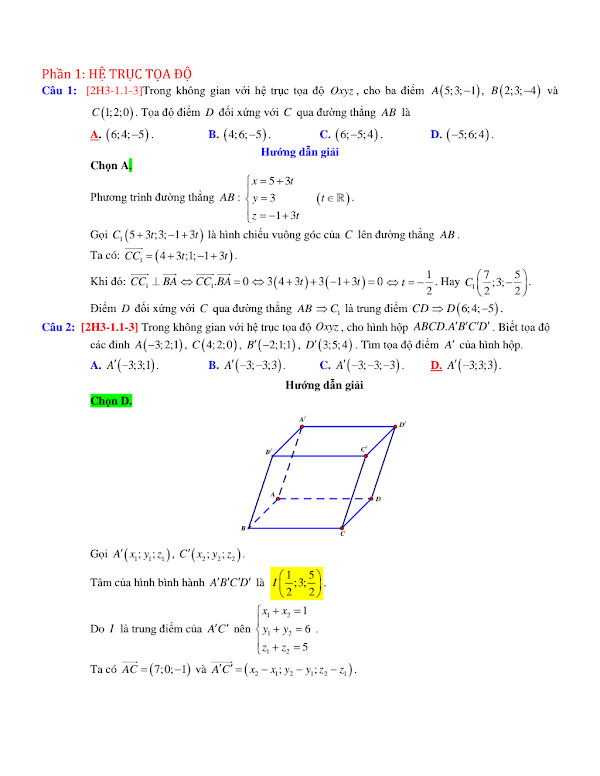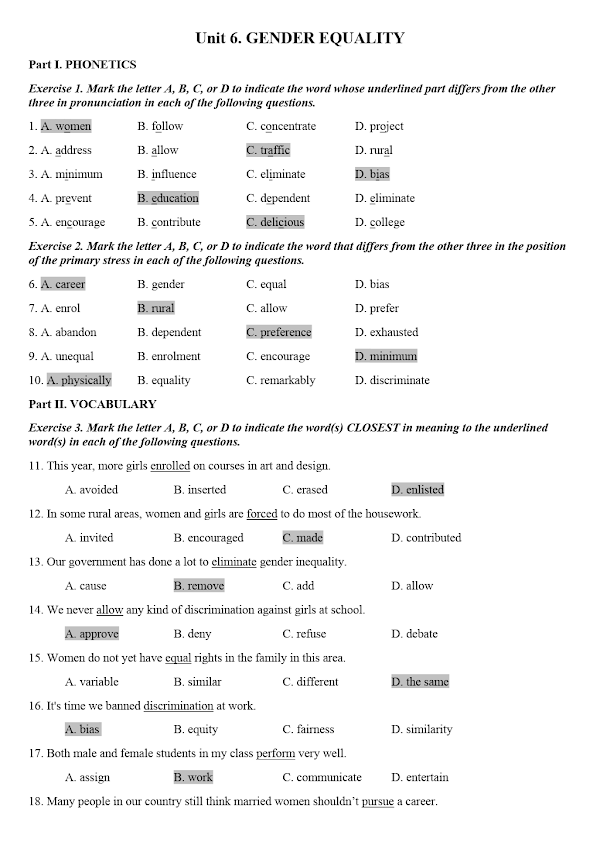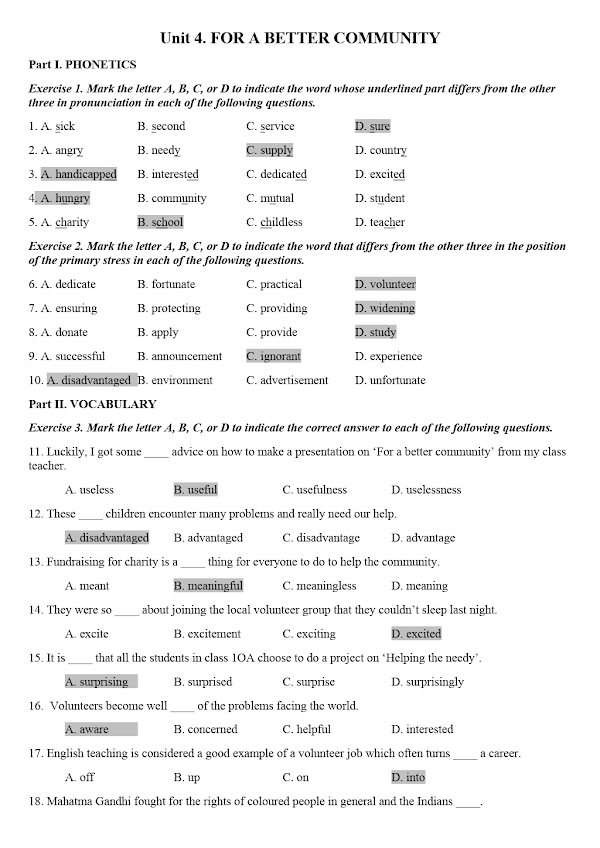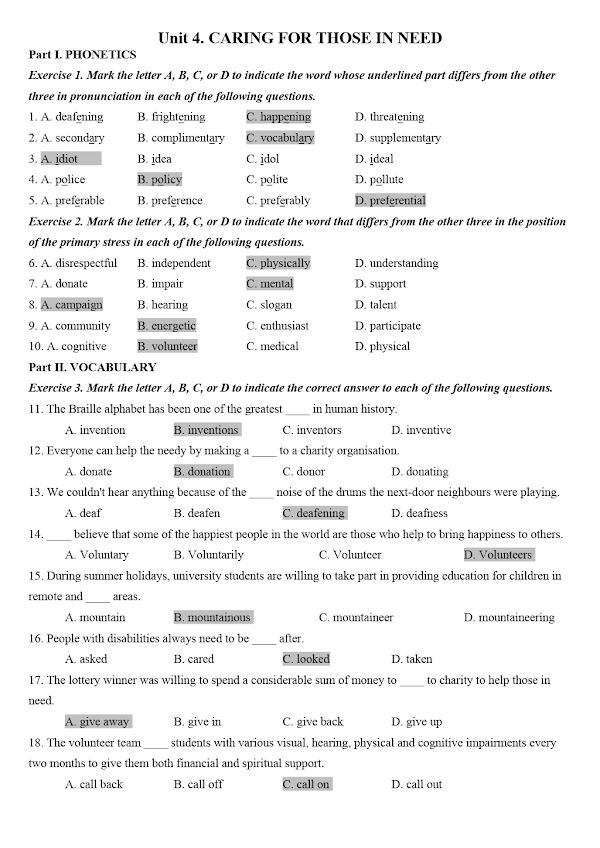ĐỀ THI HSG KHỐI 11 SỞ GD ĐT HÀ TĨNH
SỞ GIÁO DỤC VÀ ĐÀO TẠO
ĐỀ THI CHÍNH THỨC
KỲ THI CHỌN HỌC SINH GIỎI TỈNH CẤP THPT
NĂM HỌC 2016 - 2017
(Đề thi có 12 trang) Môn thi: TIẾNG ANH – LỚP 11
Thời gian làm bài: 180 phút Thí sinh không sử dụng bất kể tài liệu nào, kể cả từ điển. Thí sinh làm bài trực tiếp vào đề thi, ghi câu trả lời vào các ô cho sẵn. Riêng phần trắc nghiệm thí sinh chỉ ghi đáp án A, B, C hoặc D. Giám thị không giải thích gì thêm.
I. LISTENING
Hướng dẫn phần thi nghe hiểu:
Bài thi gồm 3 phần, mỗi phần được nghe 2 lần. Mở đầu và kết thúc bài nghe đều có tín hiệu và lời dẫn.
Sau khi nghe hết 3 phần của bài nghe, thí sinh có thời gian để viết đáp án vào các ô cho sẵn ở cuối các phần.
Part 1: You will hear a conversation between a clerk at the enquiry desk of a transport company and a man who is asking for travel information. Listen and answer the questions 1–10.
Questions 1–5: . Complete the notes below.Write no more than TWO WORDS AND/OR A NUMBER for each answer.
Transport from Bayswater
Example Answer: Destination Harbour City
• Express train leaves at (1) …………………….
• Nearest station is (2) …………………….
• Number 706 bus goes to (3) …………………….
• Number (4) ……………………. bus goes to station
• Earlier bus leaves at (5) …………………….
Questions 6–10: Complete the table below. Write no more than ONE WORD AND/OR A NUMBER for each answer.
TransportCash fareCard fareBus(6) $……………$1.50Train (peak)$10$10Train (off-peak)
- before 5pm or after (7) ………………… pm.$10
PAGE \* MERGEFORMAT 1
SỞ GIÁO DỤC VÀ ĐÀO TẠO
ĐỀ THI CHÍNH THỨC
HÀ TĨNHKỲ THI CHỌN HỌC SINH GIỎI TỈNH CẤP THPT
NĂM HỌC 2016 - 2017
(Đề thi có 12 trang) Môn thi: TIẾNG ANH – LỚP 11
Thời gian làm bài: 180 phút Thí sinh không sử dụng bất kể tài liệu nào, kể cả từ điển. Thí sinh làm bài trực tiếp vào đề thi, ghi câu trả lời vào các ô cho sẵn. Riêng phần trắc nghiệm thí sinh chỉ ghi đáp án A, B, C hoặc D. Giám thị không giải thích gì thêm.
Điểm của toàn bài thiCác giám khảoSố phách(Bằng số)(Bằng chữ)(Ký và ghi rõ họ tên)(Do chủ tịch Hội đồng ghi) Giám khảo 1:
Giám khảo 2:
I. LISTENING
Hướng dẫn phần thi nghe hiểu:
Bài thi gồm 3 phần, mỗi phần được nghe 2 lần. Mở đầu và kết thúc bài nghe đều có tín hiệu và lời dẫn.
Sau khi nghe hết 3 phần của bài nghe, thí sinh có thời gian để viết đáp án vào các ô cho sẵn ở cuối các phần.
Part 1: You will hear a conversation between a clerk at the enquiry desk of a transport company and a man who is asking for travel information. Listen and answer the questions 1–10.
Questions 1–5: . Complete the notes below.Write no more than TWO WORDS AND/OR A NUMBER for each answer.
Transport from Bayswater
Example Answer: Destination Harbour City
• Express train leaves at (1) …………………….
• Nearest station is (2) …………………….
• Number 706 bus goes to (3) …………………….
• Number (4) ……………………. bus goes to station
• Earlier bus leaves at (5) …………………….
Questions 6–10: Complete the table below. Write no more than ONE WORD AND/OR A NUMBER for each answer.
TransportCash fareCard fareBus(6) $……………$1.50Train (peak)$10$10Train (off-peak)
- before 5pm or after (7) ………………… pm.$10(8) ……………(9)……………………. ferry$4.5$3.55Tourist ferry (10. …………………….)$35_Tourist ferry (whole day)$65_Your answers:
1.6.2.7.3.8.4.9.5.10.Part 2: You will hear a part of a radio programme about penguins – birds which live in Antarctica. Complete the sentences with A WORD OR A SHORT PHRASE.
1. Amanda Newark has been studying penguins as part of a project run by the (1) …………………... ………………………....
2. Scientists have found some evidence of what is known as (2) …………………................................. among penguins of Antarctica.
3. Amanda explains that the relationship between heart rate and (3) …………………......................... is similar in penguins and humans.
4. In the experiment she describes, Amanda placed a (4) …………………........................................... containing a sensor in a penguin's nest.
5. Amanda explains that, for this experiment, it wasn't necessary to (5)……………............................... the penguins.
6. To identify the penguin she had approached, Amanda put (6) …………………................................. on its front.
7. Amanda found that the penguin's heart rate increased when groups of more than (7)……………………………………….. humans approached it.
8. Larger groups of people did not upset the penguin as long as they remained (8) ……………………
……………. when they were close to it.
9. According to Amanda, we often hear about the (9) ………………………………………….. on the environment.
10. Amanda feels that the arrangements made by (10) …………………………………………have been very good so far.
Your answers:
1.6.2.7.3.8.4.9.5.10.
Part 3: You are going to hear two people (Joanne and Ralph) talking about memories they preserved from their childhood. Listen to the text and choose the best answer (1-10). There is an example (0) at the beginning.
Example: 0. As a child Joanne lived in a ___________.
A. big town in the south-west.
B. small place near the sea.
C. village with 600 inhabitants.
1. She did not swim in the sea ___________.
A. until she began to use wetsuits.
B. because she found the water cold.
C. before the age of thirteen.
2. On Friday morning they were ___________.
A. taught how to use the bus.
B. picked up at the car park.
C. taken off to swim in the sea.
3. Those who were late ___________.
A. had to be with older students.
B. were given extra lessons later.
C. had to do exercises in the room.
4. Joanne finally learned to swim because ___________.
A. she got chocolate for that.
B. there were Smarties in the water.
C. a friend of her family taught her.
5. When swimming in the sea she ___________.
A. never chased fish.
B. used to wear a wetsuit.
C. swam around buoys.
6. Swimming is a skill that people ___________.
A. should be taught at a young age.
B. do not appreciate until they are old.
C. often seem to be afraid of.
7. During the past three years Joanne’s dad ___________.
A. learned to swim within two weeks.
B. spent little money on travelling.
C. went on five residential courses.
8. Earlier, when he could not swim ___________.
A. he could not travel to the beach.
B. he could not appreciate his holidays.
C. his wife had to catch fish for him.
9. When she goes into the water ___________.
she splashes it around her.
B. she puts cream on her face.
C. it takes her a long time.
10. She no longer goes swimming because ___________.
A. her favourite pool was closed.
B. she was kicked out of the pool.
C. she became afraid of swimming.
Your answers:
1.2.3.4.5.6.7.8.9.10.
II. LEXICO – GRAMMAR
Part 1:
Choose the correct word or phrase to complete each sentence. Write your answer A, B, C or D in the numbered boxes.
1. ______ for Tom’s opposition, we would have agreed to the contract.
A. Be it not B. Would it not have been
C. Should it not have been D. Had it not been
2. Do not ______ the driver while the bus is still in motion.
A. distract B. disturb C. convert D. interrupt
3. ______ comes a time when you have to make a decision and stick to it.
A. It B. Therefore C. There D. That
4. Safety experts are trying to establish the ______ of yesterday’s train crash.
A. cause B. reason C. grounds D. creation
5. The lawyer insisted that his client ______ never have been arrested in the first place.
A. should B. must C. ought D. would
6. The government failed to keep its promises to the workforce, ______ the call for a general collection.
A. therefore B. hence C. so D. thus
7. By this time next week, Mandy ______ her exams and we can all go out to celebrate.
A. will be finishing B. will have finished
C. is going to finish D. will finish
8. The government decided to ______ down on income tax evasion.
A. press B. crack C. push D. snap
9. The Prime Minister did not attend the conference. ______ very busy with other matters.
A. It is said he is being B. He says to have been
C. It says he has been D. He is said to have been
10. They managed to find their way out of the jungle ______ not having a map or compass.
A. despite of B. even though C. nevertheless D. in spite of
11. Many people love to watch old movies just to ______ in nostalgia.
A. flounder B. relish C. enjoy D. wallow
12. It’s not easy to make Stanley furious. The boy is very gentle by ______.
A. himself B. personality C. reaction D. nature
13. I don’t think that this fashion will ______.
A. catch on B. catch out C. catch over D. catch up
14. “Did he plead guilty?” “Yes, he admitted ______ the crime.”
A. to being B. committed C. to having committed D. to have committed
15. Maria: “This dish is really nice!”
Tom: “______. It’s called yakitori, and it’s made with chicken.”
A. It’s my pleasure. C. Sure, I’ll be glad too.
B. I’m glad you like it. D. I guess you are right.
Your answers:
1.2.3.4.5.6.7.8.9.10.11.12.13.14.15.
Part 2: Write the correct FORM of each bracketed word in the numbered space provided in the column on the right.
The carYour answersThe car has been (0) ______ (INCREDIBLE) successful. In one century it has come to dominate most of the world and the (1) ______ (INHABIT) of any developed country rely on it in all kinds of ways. Its (2) ______ (POPULAR), though, has had worrying effects on our environment. The (3) ______ (CONSTRUCT) of roads has meant the destruction of areas of natural beauty. The (4) ______ (HARM) fumes produced by car engines affect us and the (5) ______ (COUNT) species we share the planet with. Scientists and environmental (6) ______ (SPECIAL) are keen to draw attention to the dangers of our modern lifestyles. However, people seem (7) ______ (EXTREME) reluctant to give up their cars. Life behind the wheel is too (8) ______ (COMFORT) and any worries about nature and its problem are (9) ______ (SECOND). Unless we can get over our attachment to the car, we will face a (10) ______ (GROW) problem of environmental damage.Example: incredibly
1. ……………………………….
2. ……………………………….
3. ……………………………….
4. ……………………………….
5. ……………………………….
6. ……………………………….
7. ……………………………….
8. ……………………………….
9. ……………………………….
10. …………………………….
Part 3: Read the text below. If a line has a word that should not be there, write the word at the end of the line. If a line is correct, put a tick (√) next to it. There are two examples (0) and (00).
Happy Birthday AliensYour answers0 We humans must be careful, because the aliens are coming.
00 Already, strange beings walk our streets, their heads full of little
1 green men. These are ufologists and it's their year. The one first
2 report of a 'flying saucer' was for fifty years ago next month and
3 thousands of UFO enthusiasts they are going to celebrate. As
4 well as new books and films, a series of the special conferences
5 will be taking place there. At one event in London, people will be
6 able to hear talks on such subjects as abduction by aliens. In
7 America, an estimated 150,000 people who are intending to visit
8 Roswell, the site of one of the most biggest mysteries in the UFO
9 world. In 1947 it was claimed that the U.S. military did found
10 parts of an alien spacecraft here, complete with the bodies of
11 extra-terrestrials. However, and some UFO watchers now see
12 this event as a deliberate misinformation, set up to hide the truth
13 about a top secret military project. 95% of UFO sightings turn out
14 to be cases of mistaken identity – though that still leaves more 5%
15 which cannot be explained. So why not to let the ufologists party on!
0. ……the……
00. ……√……
1. ………………………
2. ………………………
3. ………………………
4. ………………………
5. ………………………
6. ………………………
7. ………………………
8. ………………………
9. ………………………
10. ……………………
11. ……………………
12. ………………………
13. ………………………
14. ………………………
15. ………………………
III. READING
Part 1: Read the following passage and decide which answer (A, B, C, or D) best fits each gap. Write your answer in the numbered boxes.
The spirit of adventure
The scientists who (0) _____work and study in Antarctica are fortunate. They can (1) _____ on the regular arrival of supplies by ship and plane, they are (2) _____ protected against the cold in comfortable, centrally-heated huts and they have specially (3) _____ vehicles called snowmobiles to move around in. But Antarctica still (4) _____ adventurers.
In 1992 two British men, Ranulph Fiennes and Mike Stroud, (5) _____ to walk across Antarctica, without any of these modern aids. They had (6) _____ to suffer a lot, and after walking for 95 days in temperatures below -40 ºC, they were in a terrible state. However, they managed to (7) _____ from one side of the continent to the other. Luckily, they were (8) _____ to radio for an aircraft, which came and picked them up from the ice.
So, why did they do it? One explanation is that human beings have a strong desire to (9) _____both with themselves and against nature. In the past, such people might have gone off to discover new lands. Today, these people (10) _____ new challenges, trying to achieve something that no human being has ever done.
Example: 0. A. currently B. formerly C. recently D. lately
1. A. live B. trust C. count D. claim
2. A. accurately B. severely C. exactly D. properly
3. A. intended B. designed C. drawn D. formed
4. A. appeals B. leads C. attracts D. catches
5. A. set out B. got away C. set up D. got by
6. A. anticipated B. waited C. predicted D. expected
7. A. reach B. cover C. cross D. arrive
8. A. adequate B. able C. capable D. efficient
9. A. compete B. attack C. oppose D. combat
10. A. search B. look C. seek D. watch
Your answers:
1.2.3.4.5.6.7.8.9.10.
Part 2: Fill each of the following numbered blanks with ONE suitable word. Write your answer in the boxes.
Songwriting
Every time a record is played in full (1) _____ national radio in Britain, its music publisher gets £40. Imagine you are the writer of that song. If you are just a beginner with a poor contract, you may only get as (2) _____ as 50 per cent of that sum. But if you are an established writer and you have a sharp business sense, the split could be as high as 80 per cent in (3) _____ favour. If you wrote the song together with someone (4) _____, the resulting money will be divided equally between you and your partner. If it was all your (5) _____ work, however, and if you are lucky enough to have come up with one of those songs that stays at number 1 for a great (6) _____ weeks or becomes an international hit, you will make a fortune. And if the song is then recorded again and (7) _____ by different artists over the years, or if it gets used on the soundtrack of a successful film, you will even be richer.
This kind of luck doesn’t happen to most songwriters, no (8) _____ how hard they try or how much talent they have. They know that, of course, but when has logic stopped people from dreaming? (9) _____ the earliest days of pop music, the possibility of writing a song (10) _____ becomes a huge hit has kept thousands of hopefuls scribbling in notebooks, experimenting on pianos or guitars or, more recently, working in their home studios.
Your answers:
1.3.5.7.9.2.4.6.8.10.
Part 3: Read the following passage and answer questions 1-13. Write your answers in the corresponding numbered boxes.
Eco-tourism
If you still believe the once-commonly held misconception that tourism is only an indulgence for the wealthy, you are out of step with the times! The tourism market is accessible to, and indeed marketed toward, many different sections of the community. Adventurers, fitness freaks, nature-lovers and business people all contribute to a rapidly expanding sector of the global economy.
Section A
This billion-dollar industry, whilst affected slightly by the unforeseen events of 11 September 2001, has experienced significant growth since the late 1980s. The subsequent economic benefits for governments are well-documented as tourism boosts foreign investment and foreign exchange. Large-scale resorts and civil infrastructure were often the only response to successful marketing and increased tourist demand. It is not surprising then that the direct impact on the environment and regional or indigenous populations became a contentious issue. Governments and big business became the target of environmentalists and activists who argued that mass tourism was not (and is not) sustainable. As hordes of tourists descended on often overcrowded beaches and overused parklands, this became apparent. Eco-tourism was born.
Section B
The broad concept of eco-tourism as a nature-based, culturally sensitive form of tourism was taken up enthusiastically because there appeared to be few losers. Governments were given a convenient escape route as eco-tourism appeased the environmentalists and local communities, but still provided income. Environmentalists saw eco-tourism as an alternative to mass tourism and its resource-exploiting ways. Local communities envisaged receiving at least a percentage of the tourist dollars, creating job opportunities and giving them control over the impact on their own communities. It seemed that the benefits of mass tourism were going to be expanded in the new world of eco-tourism to include cultural, social and environmental elements.
Section C
As evidence of the benefits of eco-tourism unfolded, the practice has spread. So much so that the United Nations nominated 2002 as the International Year of Eco-tourism. Perhaps inevitably, the meaning of eco-tourism became less clear as it enveloped the globe. It could be argued that the form of eco-tourism adopted in some cases was found wanting in certain aspects and the need for agreement on a tighter definition resulted.
The eco-tourist is one who does not wish to contribute to the negative impact of large-scale tourism. He/she generally travels in small groups to low-key developments and attempts to “tread lightly” on the earth. These smaller-scale developments are environmentally responsible with a view to sustainability in all of the resources used. Their landscaping often relies on the use of native flora and they incorporate recycling methods and energy-efficient practices.
Within the eco-tourist’s holiday experience will be an element of education about the local environment. The emphasis is on conservation and the part that humans play in keeping ecosystems functioning. If the area is of cultural or social importance, this too is highlighted.
The eco-tourist doesn’t condone the exploitation of the indigenous or local community. Far from it, they insist that the host culture is acknowledged and respected. The repatriation of funds to external sources is frowned upon. Wherever possible, the benefits of an eco-tourist’s holiday should be shared with the regional community-the hosts.
Section D
All of these elements promote minimal impact on human resources as well as on physical, cultural and environmental ones. They support conservation through education and experience. Despite the best of intentions, as popularity of eco-tourism spreads there is concern that the eco-tourist will have a more adverse effect on the environment.
Critics argue that unethical tour operators wanting to take advantage of the trendy eco-tourism market print brochures that espouse the ethics of eco-tourism and show familiar emblems of green frogs and crocodiles to promote themselves but do little else. If such operators are not held accountable, the industry will not survive. Open and honest eco-tourism marketing as well as world-recognised accreditation must be endorsed and implemented.
The sheer volume of tourists wanting to visit unique, unspoiled environments is also a cause for concern. Evidence of the need to restrict the number of visitors to sensitive areas exists in many eco-tourist attractions already. Hikers and bush walkers in Mount Kenya National Park have caused damage by straying from set trails and leaving food scraps behind. The number of Orca whales visiting Canada has declined in recent migratory seasons, as the restrictions placed on whale-watching boats and organisers are thought to be inadequate.
Section E
Eco-tourism does not guarantee sustainable tourism and it should not be viewed as a complete cure for the problems that have beset tourism. Until all stakeholders agree to a definition of eco-tourism, insist that eco-tourism operators abide by a strict code of ethics and carefully monitor the impact of eco-tourism (and all tourism), fragile ecosystems will continue to be besieged by tourists. There must be an educational program to promote ecologically-sustainable tourism across the board, so that the underlying principle in ALL forms of tourism is the management of resources.
Eco-tourism can bring wealth to areas where there is nothing else but natural attractions. The reasons for visiting the Galapagos Islands in Ecuador can only be explained by an interest in nature itself, the subsequent tourist dollars, if re-injected into the community, can mean the survival of such habitats. Licenses and entry fees to some sites have, in many cases, replaced government funding as their source of income.
Countries as diverse as Australia, New Zealand, Costa Rica and Kenya are developing strategies to identify and cope with the constraints that inevitably come with a long-term vision of sustainable

